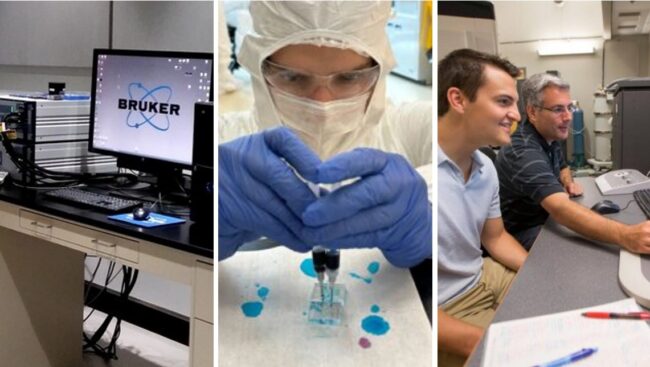Summer 2024 Short Courses
VINSE offers a variety of short courses each year to provide attendees opportunities to advance their skills and knowledge about topics relevant to a technical community. Attendance is open to all interested parties and is not limited to Vanderbilt personnel or VINSE users.

Atomic Force Microscopy
AFM is an advanced multi-parametric imaging technique. It delivers very high-resolution 3D images of the topography of the sample. It also enables the characterization of the nano-mechanical, nano-electrical, and nano-magnetic properties of the surface. Users will learn about the theory of AFM as well as practical applications, operational tips for many of the various AFM techniques. This course covers applications of the Bruker Dimension Icon AFM for imaging in liquids to access scientifically and technologically interesting solid–liquid interfaces including biological samples. The applications will include biomolecular and biophysical measurements such as force spectroscopy and stiffness measurements. Students will learn about and use many of the ever-growing suite of AFM modes. Various case studies will be explained including those of considerable current interest such as semiconductors, 2D materials, and biomaterials. Several of the case studies will demonstrate how the use of multiple AFM modes can provide a better understanding of materials at the nanoscale than using just one mode alone. Sample preparation techniques and choosing appropriate AFM probes will be demonstrated. The course will also demonstrate the nanomanipulation and nanolithography capabilities of the Dimension Icon, including “writing” techniques in either graphical point-and-click mode, or in a recipe-driven mode in air and liquid. CAP: 10
June 13 & 14, 2024 | Register
$50 Vanderbilt Users; $50 External Academic and Non-Profit Users; $150 Industry and For-Profit Users
Electron Microscopy
Electron microscopy is a critical component for the characterization of material and biological specimens at the nanoscale. Scanning electron microscopy (SEM) and transmission electron microscopy (TEM) both use electron beams to reveal structure, but in very different ways. Although these instruments have been made very accessible with the help of software, users must understand the mechanisms behind image formation to properly interpret their images. This two-day short course will blend accessible lectures with hands-on experience operating both the Zeiss Merlin SEM and the Tecnai Osiris advanced analytical TEM/STEM. After completing this course, users will know how best to operate both instruments to get the most information and achieve the best possible images. Specific techniques include secondary electron vs. backscattered electron imaging, bright field/dark field TEM, STEM and analytical SEM and STEM using energy dispersive spectroscopy. CAP: 10
June 10 & 11, 2024 | Register
$75 Vanderbilt Users; $75 External Academic and Non-Profit Users; $200 Industry and For-Profit Users
Microfluidic Device Fabrication
Microfluidics devices are critical for understanding and controlling fluid flow on the micrometer scale. Applications include portable sensors for point-of-care analysis, particle and cell sorting, nanoparticle synthesis, and organ-on-chip systems. This short course will introduce the techniques behind the fabrication and testing of microfluidic devices through a blend of lectures and hands-on experiences in the VINSE cleanroom. The course will cover microfabrication and microfluidics, photolithography, soft lithography, microfluidic device design for photomasks, and microfluidic device applications. During the course, students will fabricate a PDMS-glass microfluidic device inside the VINSE cleanroom with sessions on SU-8 mold fabrication, PDMS mixing and pouring, device assembly, and device testing. No prior knowledge of these technologies is required from the participants. CAP: 12
June 20 & 21, 2024 | Register
$150 Vanderbilt Users; $150 External Academic and Non-Profit Users; $600 Industry and For-Profit Users
